

The Growing Child- Teenager (13 to 18 Years) How much will my teen grow?

The teenage years are also called adolescence. This is a time for growth spurts and puberty changes (sexual maturation). Why Teens Are So Self-Conscious. It's not teens' fault they're so worried about what others think about them: Their brains just might be that way, according to a small new study.

Researchers from Harvard University found that adolescents not only felt more embarrassed, but also had a peak of activation in the medial prefrontal cortex (a brain region that is known for developing later in life), as well as higher connectivity between this brain region and another region called the striatum, when they were put through a test where they were made to feel like they were being watched and socially evaluated. The Psychological Science study included 69 people ranging in age from 8 to 23, who all underwent a social evaluation test with brain imaging.
Erikson Stages of Psychosocial Development in Plain Language. Erik Erikson is one name you might notice come up again and again in the parenting magazines you leaf through. Erikson was a developmental psychologist who specialized in child psychoanalysis and was best known for his theory of psychosocial development.
Psychosocial development is just a fancy phrase that refers to how a person’s individual needs (psycho) mesh with the needs or demands of society (social). According to Erikson, a person passes through eight developmental stages that build on each other. At each stage we face a crisis. Erik Erikson's Stages of Psychosocial Development. Erik Erikson was an ego psychologist who developed one of the most popular and influential theories of development. While his theory was impacted by psychoanalyst Sigmund Freud's work, Erikson's theory centered on psychosocial development rather than psychosexual development. The stages that make up his theory are as follows:1 Let's take a closer look at the background and different stages that make up Erikson's psychosocial theory. 8 Stages of Development by Erik Erikson.
Psychosocial Development Theory: Erikson’s 8 Stages. Identity vs. Role Confusion in Erikson's Theory. Identity versus confusion is the fifth stage of ego according to psychologist Erik Erikson's theory of psychosocial development.
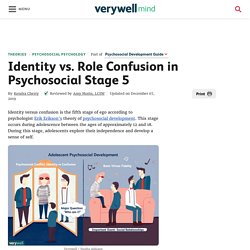
This stage occurs during adolescence between the ages of approximately 12 and 18. During this stage, adolescents explore their independence and develop a sense of self. According to Erikson, people progress through a series of stages as they grow and change throughout life. During each stage, people face a developmental conflict that must be resolved to successfully develop the primary virtue of that stage. Stages of Adolescence.
By: Brittany Allen, MD, FAAP & Helen Waterman, DO Adolescence is the period of transition between childhood and adulthood.
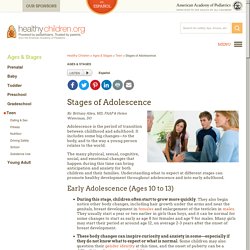
It includes some big changes—to the body, and to the way a young person relates to the world. Erikson's Stage 5. Summary Chart* Description: At this stage, adolescents are in search of an identity that will lead themto adulthood.
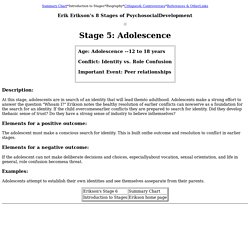
Adolescent Identity Development - Adolescence - ACT for Youth. The development of a strong and stable sense of self is widely considered to be one of the central tasks of adolescence [1].
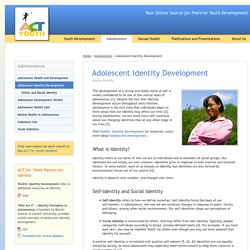
Despite the fact that identity development occurs throughout one's lifetime, adolescence is the first time that individuals begin to think about how our identity may affect our lives [2]. During adolescence, we are much more self-conscious about our changing identities than at any other stage in our lives [3]. Visit Toolkit: Identity Development for resources. Learn more about Adolescent Development. What is Identity? Who Am I?: The Big Identity Question of Adolesence. The Big Question: Who Am I?

Adolescence is a period of discovery and a time to shape identity. This phase, through which we all pass in our journey from childhood to adulthood, is filled with questions to be answered and meanings to be found. It is exciting beyond description and unsettling at its core. It is during the tween years that we begin to explore the fundamental question “Who am I?” It’s during the teen years that we (mistakenly) believe we must task ourselves with completing the answers. Why Is Teen Identity Development Important? Though it can be hard for parents to let go and acknowledge their teen needs external help, a credible adventure therapy program can relatively quickly and positively change your son or daughter’s life for the better.
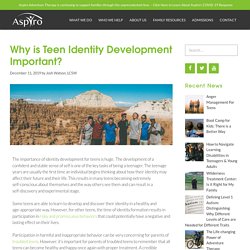
Psychologist Erik Erikson advocated that teen identity development is fostered by experiences that allow individuals to express their individuality and receive feedback and validation from others. Adventure therapy programs provide experiences that promote healthier relationships and positive identity formation in teens. A credible adventure therapy program can also positively affect a teen’s self-perception, confidence, and leadership skills by providing unique experiences and challenging opportunities that develop competence and confidence from within. When Teenagers Ask "Who Am I?" One of the most important questions that teenagers grapple with during the time of adolescence is, “Who am I?”

Then, as they are answering the question, they also have to decide, “Do I love who I am?” Self-esteem during adolescence, as we all know, can take a pretty substantial beating. I believe everyone, whether a teenager or not, really does have a deep need and desire to love who he or she is. Identity Crisis: Definition, Symptoms, Causes, and Treatment. Are you questioning who you are?
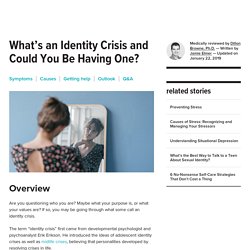
Maybe what your purpose is, or what your values are? If so, you may be going through what some call an identity crisis. The term “identity crisis” first came from developmental psychologist and psychoanalyst Erik Erikson. He introduced the ideas of adolescent identity crises as well as midlife crises, believing that personalities developed by resolving crises in life. Identity Moratorium in Tweens and Teens. An identity moratorium is one step in the process of finding a sense of self. It is a period of active searching for one's occupational, religious, ethnic, or another form of identity to determine who they really are. It is an identity crisis as part of the quest of teens and tweens to find themselves. What a Crisis of Identity Looks Like. How Adolescents Search for Identity - iMom. Menu Search Close Share what kind of mom you are! Adolescent Identity Development: What to Expect in Teens.
Adolescent Identity Development: The Factors of Change Among the profound and exciting changes taking place in adolescence is the process of self-discovery. Our teens are working to figure out who they are, making adolescent identity development a central feature of teen life. Young people’s identities are shaped by lots of factors — family, cultural and societal expectations, experiences with institutions like school and the media, and friends. Young people also take active steps and make choices that shape their identity. They select the environments and people they want to be around. Your Teen's Search for Identity.